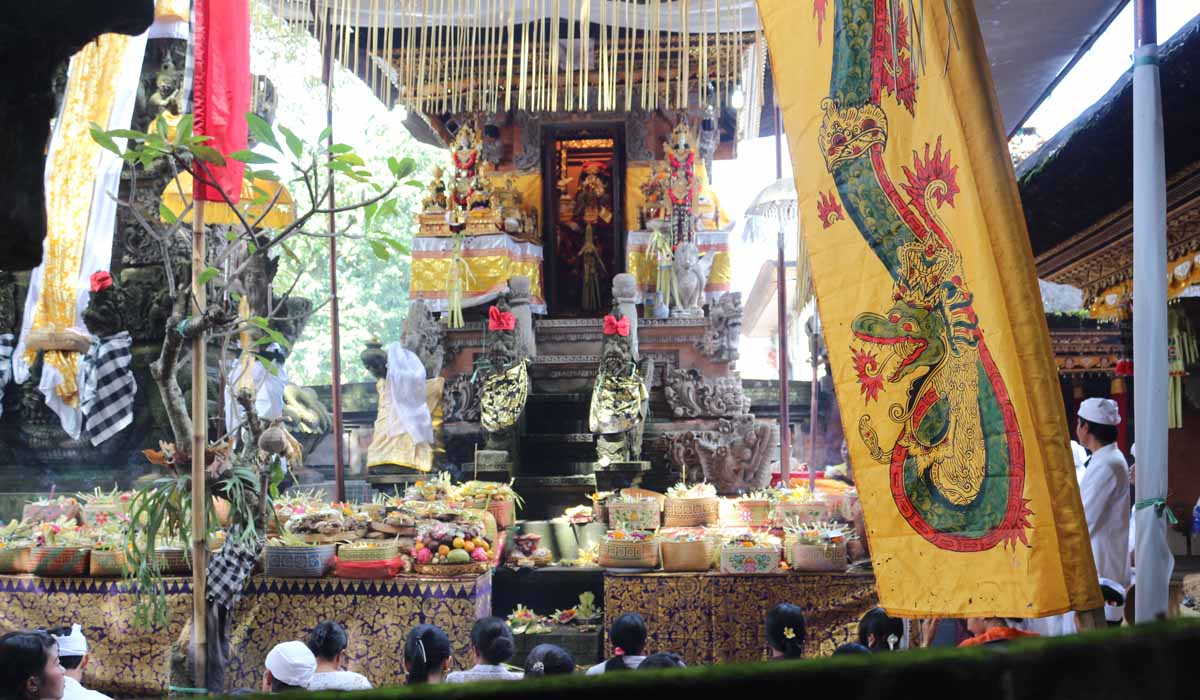Buda Cemeng Klawu – Honouring the Goddess of Prosperity
02 August 2017

Celebrated every 210 days Buda Wage Klawu or better known as Buda Cemeng Klawu is a tradition of Hinduism in Bali. In this tradition “Bhatara Rambut Sedana” honours the “Goddess of Prosperity”, who brings wealth and fortune to humans. It is often referred to as “Piodalan Ida Batara Sri Sedana”.
Ceremonies take place in domestic environments, business premises as well as Temples across Bali. It is mostly celebrated by businesses, such as market traders, shop owners, restaurants and financial institutions. Special offerings are given to honor Ida Batara Sedana or “Goddess of Prosperity” as a form of gratitude for this gift.
On this day the people of Bali are not allowed to use money for things that are not returned to them in the form of goods, such as too pay debt because they believe that this money will be lost forever.
In Hindu literature it is understood that money is essentially a means not the purpose of life, depending on how we choose to use it. If we use appropriately based on the concept of God it leads to a happy physical and spiritual life. If money is considered the most important thing in life, the belief is it will bring misery. Therefore use the money as a means of realizing the Dharma / truth / goodness.
“Doing one’s dharma means not only remaining ethical but also assuming the duties that are proper to the class or society we are born into (due to one’s past karma), and to the stage of life we are presently in.”
The ceremony then followed the usual Balinese traditions, incense sticks lit to cleanse and purify the body and spirits. Further purification by sprinkling and drinking of blessed water from the Beji (place of Holy spring water) at the Pura Luhur Candi Narmada Temple. We were then given what is referred to as a “holy shower” in which the water is poured onto our heads and over our bodies. Rice is then placed on our forehead, temples and chest for good fortune and prosperity, also three grains of the rice was consumed. The Pemangku then positioned a piece of white thread on our heads which signifies purity and strength. The ceremony finishes by eating small portions of the food in the offerings (fruit, crisps, cake) which is for a happy and prosperous future.
Article source by : Arhttps://gemstone78.wordpress.com/2015/04/22/buda-cemeng-klawu/

Celebrated every 210 days Buda Wage Klawu or better known as Buda Cemeng Klawu is a tradition of Hinduism in Bali. In this tradition “Bhatara Rambut Sedana” honours the “Goddess of Prosperity”, who brings wealth and fortune to humans. It is often referred to as “Piodalan Ida Batara Sri Sedana”.
Ceremonies take place in domestic environments, business premises as well as Temples across Bali. It is mostly celebrated by businesses, such as market traders, shop owners, restaurants and financial institutions. Special offerings are given to honor Ida Batara Sedana or “Goddess of Prosperity” as a form of gratitude for this gift.
On this day the people of Bali are not allowed to use money for things that are not returned to them in the form of goods, such as too pay debt because they believe that this money will be lost forever.
In Hindu literature it is understood that money is essentially a means not the purpose of life, depending on how we choose to use it. If we use appropriately based on the concept of God it leads to a happy physical and spiritual life. If money is considered the most important thing in life, the belief is it will bring misery. Therefore use the money as a means of realizing the Dharma / truth / goodness.
“Doing one’s dharma means not only remaining ethical but also assuming the duties that are proper to the class or society we are born into (due to one’s past karma), and to the stage of life we are presently in.”
The ceremony then followed the usual Balinese traditions, incense sticks lit to cleanse and purify the body and spirits. Further purification by sprinkling and drinking of blessed water from the Beji (place of Holy spring water) at the Pura Luhur Candi Narmada Temple. We were then given what is referred to as a “holy shower” in which the water is poured onto our heads and over our bodies. Rice is then placed on our forehead, temples and chest for good fortune and prosperity, also three grains of the rice was consumed. The Pemangku then positioned a piece of white thread on our heads which signifies purity and strength. The ceremony finishes by eating small portions of the food in the offerings (fruit, crisps, cake) which is for a happy and prosperous future.
Article source by : Arhttps://gemstone78.wordpress.com/2015/04/22/buda-cemeng-klawu/

